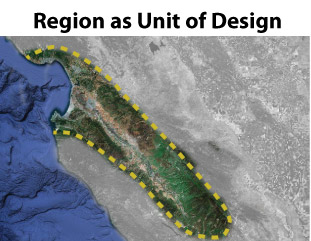 A “region” includes relatively whole ecosystems (natural, social and economic), is large enough to be politically and economically significant, and small enough to be called home by its inhabitants.
A “region” includes relatively whole ecosystems (natural, social and economic), is large enough to be politically and economically significant, and small enough to be called home by its inhabitants.
As colorfully depicted in our Future Scenarios Lens, humanity is facing an unprecedented decision-point. We have an infinite number of possible futures. At the extremes we can either:
- Keep on with our collective caterpillar-like social systems (myopic growth and consumption-centric), or
- Transform our systems to become more butterfly-like (touching the earth lightly, adding beauty; demonstrating boundary-crossing inter-species collaboration.)
The caterpillar has been given the innate capacity to create a chrysalis for itself and take the time required to transform itself into a butterfly. Our challenge as humans is to develop the capacity to do the “chrysalis work” needed to perform the same magic for our social forms — our organizations, regions, communities and neighborhoods.
MISA has chosen to help pioneer this chrysalis work. We have become convinced that “region” is the appropriate unit of design for addressing this unique capacity-building challenge.
region — A geographic area that is 1) large enough to include whole watersheds and bio-regions as well as viable socioeconomic ecosystems, and 2) small enough to be embraced as home by its inhabitants.
By focusing on a region as our basic unit of design it is possible:
- To rise above the pervasive sense of hopelessness and helplessness implicit in today’s entangled and fragmented social systems.
- To realize myriad economies of wholeness. (The true costs of fragmentation is staggering. The true benefits of designing our social forms as models of and contributors to wholeness are HUGE.)
- To unite the game-ready infinite players (GRIPs) from all sectors, levels and walks of life. (We are not alone. We’re all in this region together. Together we can create a future that works for all of life.)
- To turn the energy of frustration and helplessness implicit in today’s forms into the unlimited energies implicit in the co-creative collaboration implicit in whole conscious living systems.
- To achieve the economies of scope and scale needed to get at the root systemic causes of a region’s ills.
- To evolve developmental capacity that can serve all systems blessed with leadership committed to transformational change.
Thoughts on bounding your region:
- Include whole water ecosystems, i.e., downstream as well as upstream watersheds.
- Set boundaries respecting the wholeness of the rest of Nature’s ecosystems.
- Region could become self-sufficient, or at least self-sufficient in partnership with a few other regions.
- Respect the integrity of cultural/ethnic ecosystems as we would the natural ecosystems.
- Include requisite diversity along as many dimensions as possible: cultures, ethnicities, plants, wildlife, religions, wealth, etc.
- Make it large enough to be respected by other political entities.
- Make it small enough to be embraced as “home.”
- Respect natural transportation boundaries.
 A “region” includes relatively whole ecosystems (natural, social and economic), is large enough to be politically and economically significant, and small enough to be called home by its inhabitants.
A “region” includes relatively whole ecosystems (natural, social and economic), is large enough to be politically and economically significant, and small enough to be called home by its inhabitants.